CONTENTS
Did You Know? BR Sports Academy
Did You Know? Four Little Points
Snapshot: Harry Rabenhorst
First: Shaq's 30-point SEC Game
Snapshot: Maravich's Freshman Circus
First: AP Poll Ranking
The Dark Knight Strikes
Snapshot: Ricky Blanton - I
Snapshot: Ricky Blanton - II
Tigers Are Back!
Tiger Den Archives – I
Tiger Den Archives – III
Tiger Den Archives – IV
Tiger Den Archives – V
Tiger Den Archives – VI
Basketball Magazine
Golden Rankings Home
Top of Page |
Tiger Den Basketball Archives – II
Did You Know? BR Sports Academy
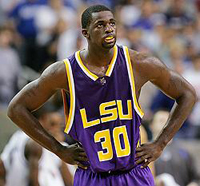
Brandon Bass
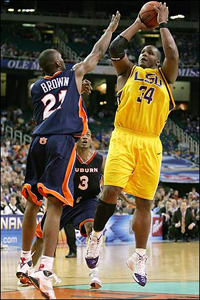
Glen Davis
|
- Glen "Big Baby" Davis of the Boston Celtics
- Tyrus Thomas of the Chicago Bulls
- Brandon Bass of the Dallas Mavericks.
All three NBA players went to LSU, of course. But they also have something else in common. All are "graduates" of the Baton Rouge Sports Academy, an entity of the East Baton Rouge Parish Recreation & Park Commission. Others who have played basketball for Academy teams include current Tiger Tasmin Mitchell, former Tigers Collis Temple III and his brother Garrett, and T. J. Pugh, Tiger PG from 1990-2. Another name to add to this list is Keith Smart, he of the game-winning shot in the national championship game for Indiana in the Superdome in 1987.
All these players also beat great odds to succeed on the college and pro levels. The three NBAers grew up with no father figure at home. They were precisely the children BRSA targeted for help. Davis says, "To come from the background we came from and to make it in the NBA says a lot. And a lot of credit goes to the Sports Academy."
Collis Temple Jr., the first African-American basketball player at LSU and the father of Collis III and Garrett, is the unofficial spokesman for the program to which he has contributed much volunteer time as a coach and mentor. Davis stayed with the Temples for a while as a kid.
Which youngster now playing ball at the Sports Academy will be the next Glen Davis?
Reference: "Beating the Odds,"The Advocate, May 3, 2009 |
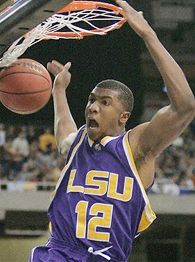
Tyrus Thomas
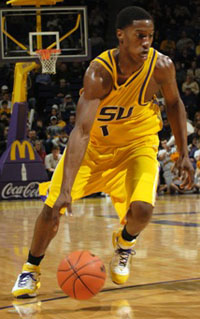
Tasmin Mitchell
|
|
Did You Know? Four Little Points
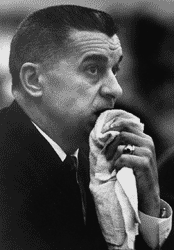 Press Maravich
Press Maravich
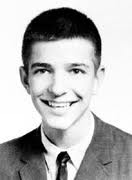
Young Pete Maravich
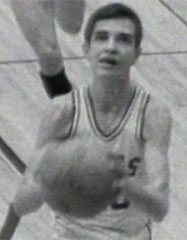
Pete Maravich in high school
|
Four little points. That was the difference between Pete Maravich coming to LSU and taking his immense talent to another school. And the points are not the kind you get by putting the ball through the hoop. Let me explain.
Pete's father, Press, was an assistant coach at North Carolina State for the 1963-4 season. He was the handpicked successor of the legendary Everett Case. However, Case's declining health due to cancer accelerated the timetable. Press took the reins early in the 1964-5 season when Pete was a 6'3" 150 lb senior at Broughton High School in Raleigh. With almost no help from the other players on the team, "Pistol Pete," as he had already been dubbed by a sportswriter, regularly scored over 40 points in the 32-minute prep games and wowed everyone with his ballhandling and passing. Press salivated at the thought of coaching his son at NC State.
There was one problem, however. Pete had never shown much interest in school, spending huge amounts of time on the basketball drills his father had taught him. The Atlantic Coast Conference required all players receiving an athletic scholarship to score at least 800 on the Scholastic Aptitude Test (SAT). As his high school career drew to a close, Pete had yet to attain that figure.
As a result, Press decided to send Pete to Edwards Military Institute (Salemburg NC) for a year. Papa gave two reasons for the decision: Pete needed to (a) put more weight on his skinny frame and (b) improve his test score. The move would also give Press another year to recruit prep stars with the pitch that they would get to play with the most incredible player anyone had ever seen.
Edwards played many games against college freshman teams in that era when college recruits could not play varsity ball until their second year. Pete led all scorers and dominated each game against frosh teams, including two victories over NC State. He scored 50 against Charleston Southern.
Pete grew taller and stronger during his year at the Institute. However, he never attained the magic 800 on the SAT. His highest score was 796. Four points short. There was no way he could play in the ACC. Furthermore, Pete had decided he didn't want to play for his dad, particularly since life at home had fallen into turmoil with the developing emotional and drinking problems of his mother which would eventually lead to her suicide. Pistol saw himself as Jerry West's successor at West Virginia, a school with no minimum SAT requirement. The Mountaineer coach, Bucky Waters, thought that Pete's signing with him was "a lock." Then an outside force intervened.
LSU AD Jim Corbett called Press to inquire about his interest in the vacant basketball job in Baton Rouge. Tiger hoops had fallen on hard times since Bob Pettit's departure after the 1953-4 season. Not even a second-class citizen after football – more like third- or fourth-class – LSU roundball lacked funding, a quality arena, publicity, and interest. Frank Truitt had quit after only one season to go to Kent State, which he considered a promotion. That Truitt's one-year record of 6-20 was considered a "good start" on resurrecting the program shows the depths to which Tiger basketball had fallen. [Personal note: I watched LSU play several conference games that season in the Catholic High Gym. And, believe me, there were plenty of empty seats.]
Corbett asked Press two questions up front. Would you be interested in becoming the basketball coach at LSU? Would you bring your son with you? And, by the way, LSU requires no minimum SAT score for athletic scholarships. Jim offered a salary $5,000 above Press's current pay and pointed out that LSU had a "$5 million" field house on the drawing board. So, when he got Case's blessing, Maravich Pere accepted the job. He gave the increased pay as his public reason for the lateral (at best) move. However, his real motivation was the opportunity to coach his son.
Only one fly in the ointment. Pete insisted he was going to West Virginia. Press threatened to disown Pete or even do him bodily harm. Press had yelled at Pete his whole life, but the extra desperation this time caused Pete to cave in.
So file this under the heading of "What Might Have Been." If Pete had answered one more SAT question correctly, he might have made the 800 he needed instead of 796. Press would have stayed in Raleigh, and Pete would have set NCAA scoring records in the red and black of the Wolfpack.
Reference: Pistol: The Life of Pete Maravich, Mark Kriegel
|
|
Snapshot: Harry Rabenhorst
Harry Rabenhorst was a member of the athletic staff at LSU from 1925 through 1968. He was an assistant coach in football for many years and head coach in both basketball and baseball. His chief claim to fame is that he coached the first Tiger team to make the Final Four.
A native of Baton Rouge, Rabenhorst attend Wake Forest (a Baptist school although Harry was a devout Catholic). He is famous there for his 110-yd punt, still an NCAA record. [How do you get credit for a 110-yd punt, you ask? In a 1919 game against North Carolina State, Rabenhorst punted from his own end zone. Aided by a light breeze, the kick traveled 89 yd in the air, bounced off a Wolfpack player, and was recovered in the EZ for a TD by a Demon Deacon after a 21-yd roll. Strictly speaking, of course, since a punt's distance is measured from the line of scrimmage, the longest punt possible is 99 yd.]
Coach Raby came to LSU in 1925 after coaching high school for four seasons. He was hired as an assistant football coach and served in that capacity for 18 seasons. However, his primary position was head basketball coach. He coached the Tiger roundballers from 1925-26 through 1956-7 with the exception of 1942-45 when he served in the military. He became head baseball coach for the 1927 season and remained in that capacity as well through 1956 except for those three years during World War II.
His final record in 29 seasons as head basketball coach was 340-264 for a .563 winning percentage. He coached the 1934-5 team that went 12-0 in the SEC and won the mythical national championship by defeating Pittsburgh in Atlantic City behind Sparky Wade. However, the three seasons 1951-4 were Rabenhorst's greatest.
- 1951-2: With Joe Dean a senior All-SEC guard and Bob Pettit a sophomore, the Tigers went 17-7. A 44-43 loss to Kentucky in the SEC Tournament title game prevented Raby's boys from qualifying for the NCAA tournament since only conference champions were admitted then.
- 1952-3: LSU went 13-0 in the SEC to qualify for the NCAA tournament for the first time in school history. The team reached the Final Four before losing to Indiana 80-67 and then Washington in the third-place game 88-69 to end the season 22-3.
- 1953-4: Pettit closed his LSU career with another undefeated SEC season (14-0). The Tigers didn't play Kentucky until the playoff game to decide the league championship and NCAA tournament participant. The Wildcats won 63-56 but, when three of their starters were ruled ineligible for the post-season, Adolph Rupp withdrew his team from the tournament and LSU took their place. The Tigers lost their first game to Penn State 78-70 and then fell to Indiana in the regional consolation game, 73-62.
After Pettit's graduation, Tiger roundball fortune took a nosedive. Rabenhorst was only 19-54 in his last three seasons. He retired having never beaten Kentucky on the hardwood. He died in 1972 at age 73. He was universally revered by his former players as an outstanding gentleman and role model. When Harry retired in 1968, Sports Information Director Carl "Ace" Higgins wrote of him:
In any capacity he has served, he has shown the same gracious understanding of the individual and devotion to duty that have set him apart from the ordinary. ... Few men alive in collegiate athletics number among their close personal friends the great and near-great personalities who dominated the athletic scene for the past fifty years.
None other than "Baron" Rupp said about Harry: "I always enjoyed competing with him. He developed some of LSU's outstanding players and teams."
|
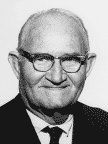 Harry Rabenhorst

Joe Dean
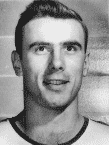
Bob Pettit
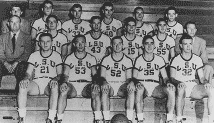
Basketball Team 1952-3
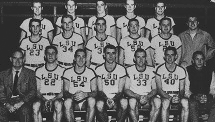
Basketball Team 1953-4
|
Tiger Firsts: Shaq's 30-point SEC Game
The 1990-1 Tigers entered SEC play with an 8-2 record and #14 ranking. The losses had come to Villanova 93-91 in the Tipoff Classic in Springfield MA in November and at Illinois 102-96 December 22. Sophomore sensation Shaquille O'Neal scored 53 points against Arkansas State on December 18 to break Chris Jackson's Maravich Assembly Center record of 50. He also established P-MAC marks with 17 FTs made and 21 FTA. He also rang up 19 rebounds and 4 blocks.
The first conference opponent was Vanderbilt on January 2 in Baton Rouge. Shaq sparked the 87-70 rout with his first 30-point SEC game. The 7'1" C poured in 34, and Mike Hansen added 24 with half coming from 3-point range. O'Neal raised his average for the season to 28.8 ppg.
Vandy coach Eddie Fogler had praised Shaq the year before when he was a freshman. "O'Neal's so good it's a joke. He looked bored out there. .... To say O'Neal is terrific is probably not strong enough." Now, after losing by 17 to LSU, Fogler added more praise. "He's so much better than last year. It's not even close."
The next week, Shaq led the Tigers to a 83-76 home win over Georgia with 34 points, 16 rebounds and 7 blocks. His only triple double of the season also came at home against Florida January 26: 31 points, 21 rebounds, 10 blocks in a 76-66 triumph.
After losing to Vandy in the rematch February 2, their third SEC loss in four games, Dale Brown's club caught fire, winning seven in a row. During that stretch Shaw delivered 33 against Kentucky, 38 against Georgia, 36 vs Alabama, an SEC-high of 38 against Ole Miss, and 33 vs Tennessee.
A leg injury forced the big guy to sit out the finale against Mississippi State. The 76-73 loss in Starkville cost LSU a chance to win the SEC regular season title outright. When Shaq also missed the opening game in the SEC Tournament, the Tigers lost to Auburn. He returned for the NCAA tournament loss to Connecticut but was clearly not 100%.
The Tigers finished 20-10 and held their breath hoping Shaq would return for his junior season. [He did.]
|
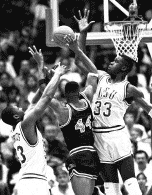
Shaquille O'Neal (#33)
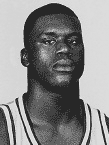
Shaq before he was
the Big Aristotle
|
|
Snapshot: Maravich's Freshman Circus
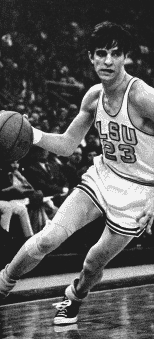
Pete Maravich
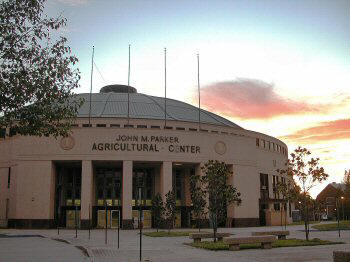
Parker Agricultural Center
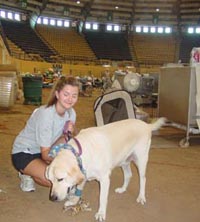
AgCenter Used as Animal Shelter after Katrina
|
Pete Maravich arrived at LSU with his father as coach for the 1966-7 school year. Under NCAA regulations, first-year students were ineligible for varsity play. So Pete would play on the freshman team, which played most of its games at 5:45 before the varsity contest.
Press considered his first season in Baton Rouge "the roughest year I have ever had in basketball." In addition to inheriting a lousy team that would go 3-23, Press had to coach home games in the John M. Parker Agricultural Center, unaffectionately known as "The Cow Palace." Because it was used for 4H shows and rodeos, the place smelled as bad as the varsity played. The court was laid over the dirt floor.
But manure or not, the fans turned out in unprecedented numbers during the 1966-7 season – to watch the freshman games. Pete's reputation preceded him to Bayou Country, and fans and students who had never attended a Tiger game – at least since Bob Pettit left after the 1954 season – now stood in line to get tickets so they could watch The Pistol.
By the time the season started, Pete's new teammates had learned that "the only time you didn't have to worry about Pete throwing you the ball was when he was looking right at you." No one anywhere, much less Maravich's teammates, had ever seen anyone do what he routinely did with the basketball. Just before the first game, Press pitted the varsity against the freshmen. His son lit up the older players for 49, which was immediately reported to the news media.
In the first game, against Southeastern Louisiana, Pete scored 50 with 16 assists and a standing ovation as the team left the floor following a 119-70 blowout. (The varsity lost to SLU 89-88.) Advocate reporter Joe Planas wrote: "From this day hence ... a lot of people are going to start going to a lot of LSU basketball games – a lot earlier." Governor John McKeithen became a regular in the front row. LSU averaged 9,200 fans in a building that sat only 8,000. Several thousand more were turned away each night. The varsity would watch the freshmen game in a packed gym. By the time they took the court for the nightcap, about 1,000 remained in the stands.
Even in the supposedly low-key freshman games, opponents used a physical approach to try to stop Pete. A shot to the eye against Southern Mississippi in Hattiesburg sent him to the emergency room for nine stitches. He hurried back to the gym and ran right past coach Greg Bernbrock and into the game. He finished with 42, including 12-12 from the line, to keep the Cubs' perfect season alive.
Fans at other SEC venues also arrived early to catch Pete's Traveling Circus, which was 17-0 going into the finale at Tennessee. Pete shot only 12 for 36 for 31 points. With seven seconds left, the Vols led 75-73 when Pete took the inbounds pass and cut in front of a trailing defender to draw a foul. A 83% FT shooter, Maravich made the first but missed the second. There went the perfect season.
Unfortunately, Pete had started partying and drinking with no reprimand from the head coach. Varsity and freshmen players quickly learned that Press had a different standard – actually no standard at all – for his son. If you were going to violate training rules, do so with Pete to avoid the wrath of Press.
Reference: Pistol: The Life of Pete Maravich, Mark Kriegel
|
|
The Associated Press basketball poll debuted for the 1952-3 season. The first poll on December 16, 1952, listed LSU tenth. La Salle was first.
The Tigers had begun with four straight home wins: Birmingham Southern 98-38, Pensacola Navy 107-59, Southwestern College (TN) 124-33, and Miami (FL) 86-58.
After defeating Alabama 58-45 in the first road game to rise to #8 in the next AP poll, Harry Rabenhorst's squad lost at #15 Tulsa 58-84. As a result, LSU fell to 17th.
 1952-3 Tigers Starting with Villanova (100-94) and St. Louis (70-67) in the Sugar Bowl basketball tournament, the Tigers ripped off 19 straight wins to rise to #5 in the final poll on March 24 behind #1 Indiana. They finished 13-0 in SEC play in a year when Kentucky did not compete because of NCAA sanctions.
As SEC champs, the Tigers entered the NCAA tournament for the first time where they reached the Final Four.
Snapshot: The Dark Knight Strikes
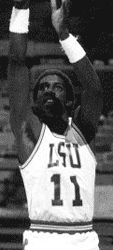
Anthony Wilson

Bernard Woodside
|
After finishing the regular season 21-14, the 1987 Tigers went on a magical run in the NCAA tournament as the #10 seed. They came within one point of reaching their second straight Final Four.
- Georgia Tech 85-79 @ Rosemont IL
- Temple 72-62 @ Rosemont IL
- DePaul 63-58 @ Cincinnati
In addition to 3-point specialist Anthony Wilson, PG Darryl Joe began hitting from beyond the arc, as did the other G, Bernard Woodside. And the team played outstanding D, especially Oliver Brown. Quick C Nikita Wilson rounded out the starting five.
That brought Dale Brown's crew into the Regional Final against Bobby Knight's Indiana Hoosiers, the #1 seed. The Tigers led most of the game only to lose in the last seconds, 77-76.
In his book Dale Brown's Memoirs from LSU Basketball, the coach recalled a key incident in the game.
Anyone who's ever kept up with college basketball remembers that Bobby Knight incident ... He intimidated the officials and slammed down the phone at the scorer's table – and they did nothing. If I had that instance to do over again, I wouldn't have assumed such a passive posture as I did. I had made up my mind if there was going to be a controversy, then I wanted to be the cool-headed one, which didn't come easy for me.
The NCAA fined Knight $10,000 and dropped those referees from the rest of the tournament. It was too late to help LSU any, though. ... Indiana went on to win the national championship in the Superdome, and had there been three stronger officials, it could have been us.
After the game, Knight told the media, "I wasn't sure we could beat this team. Coach Brown got all he could out of them." However, Bobby changed his tune after Dale told Bob Costas that Knight had acted like a bully. In a book about the Hoosiers' 1987 season, Knight told the author, "I was worried about losing the game until I looked down the floor and saw Dale Brown. Then I knew we had a chance." |
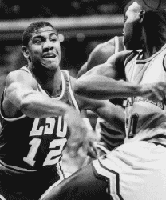
Darryl Joe

Nikita Wilson
|
|
Snapshot: Ricky Blanton – I
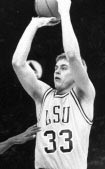
Ricky Blanton

Nikita Wilson
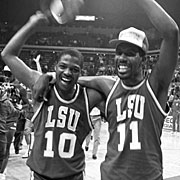
Derrick Taylor and Anthony Wilson celebrate SE Region Championship
|
The SEC inaugurated the Spirit Award in 1989. The criteria required a player to:
- Model the ideals of athleticism.
- Overcome adversity.
- Demonstrate extraordinary performance that exceeds all expectations.
The first winner was an overwhelming choice: LSU's Ricky Blanton.
- Ricky had been prep player of the year in Miami his senior year of high school.
- The 6'6" G-F arrived at LSU in 1984 when the talent level was at an all-time high. As a result, he played little as a freshman, averaging only 3.5 ppg and 1.8 rpg.
- Blanton almost transferred to his hometown school of Miami but decided to stay. After hitting the weights, he added more than 20 pounds in the off-season. Yet he couldn't dunk the ball.
- At the end of the first semester of the 1985-6 season, Nikita Wilson was ruled ineligible because he was given an F for missing an exam while the team was on a road trip. Since the backup C, Zoran Jovanovich, had been lost for the season to knee surgery, Dale Brown turned to Blanton.
- Beset by illness and injuries during conference play, the team finished the regular season 22-11 with three of the setbacks to Kentucky. That was good enough to gain a #11 seed in the NCAA Tournament.
- With Ricky holding his own in the middle, the Tigers went on a remarkable run starting with two games in the Maravich Center.
- Purdue 94-87 (2 OT)
- Memphis State 83-81
- Both coaches, Gene Keady of the Boilermakers and Dana Kirk of Memphis, complained about playing a tournament game on the opponent's home court. And the NCAA changed its rules the next season to prevent that from happening again. In the meantime, the Tigers advanced to the Southeast Regional in Atlanta.
- In the regional semifinal, LSU scored a 70-64 victory over Georgia Tech, which was playing in its home city if not its own gym.
- That brought the Tigers face-to-face with the Kentucky Wildcats.
- Dale Brown claims that, after UK beat his team in the SEC Tournament, he told the players: "We're going to meet them again in the NCAA Tournament, and they will not beat us a fourth time."
- Sure enough, the Tigers upset Eddie Sutton's club 59-57 to become the lowest seed ever to make the Final Four.
- Ricky scored the clinching basket in the last minute of play and is forever remembered in Tigerland for his jubilant run down the court waving his arms.
- Blanton neutralized Lousville's C Pervis Ellison, an eventual #1 NBA draft pick, in the Final Four, but the Cardinals ended LSU's Cinderella run, 88-77.
Ricky returned for his junior season with high hopes. However, disappointment awaited him.
|
|
Snapshot: Ricky Blanton – II
Ricky entered his junior season as one of only two starters returning from the 1986 Final Four team. However, a severe knee injury in an exhibition game ended his season. All he could do was cheer from the sidelines and mentor the younger players as the Tigers came within a basket of making the Final Four again.
Blanton returned to action in the summer of 1987 in the Olympic Trials but did not make the U.S. squad. For LSU's '87-88 campaign, he served as co-captain along with Bernard Woodside.
- He earned All-SEC honors, averaging 17.0 points and 8.8 rebounds.
- The team finished 16-14 (10-8 SEC). A 67-60 victory over Vanderbilt in the first round of the SEC Tournament at the Maravich Center clinched an NCAA berth.
- The Tigers lost a close one to Georgetown in the first round, 66-63.
Returning for his senior year as captain once again, Ricky enjoyed playing with sensational freshman Chris Jackson. However, five of the eight freshmen in one of the best recruiting classes in the nation didn't make the required test scores and sat out the year. As a result, LSU was not expected to be an SEC contender.
- Ricky served as Dale Brown's assistant on the court, guiding the young Tigers to within a game of the regular season SEC title. He averaged 20.3 ppg and 8.2 rbg.
- One of the highlights of the season was upsetting #2 Georgetown 82-80 in the Superdome on January 28. Blanton scored the winning basket on a layup just before the buzzer to send the announced crowd of 66,144 into a frenzy.
- Another personal high for Ricky was sinking a three-point basket from the corner to defeat #18 UNLV 88-87 on February 25 in Baton Rouge.
- The Tigers finished the regular season 20-12 to make the NCAA Tournament. However, LSU lost the opening round game to UTEP 85-74 in Tucson. Coupled with the first round defeat at the hands of Tennessee in the SEC Tournament, the loss was the fourth in a row after the upset of UNLV.
- Ricky joined Jackson on the All-SEC team.
Dale Brown has admitted that when he first saw Ricky play, he "wasn't overly impressed."
I could tell he had a wonderful work ethic and a great attitude, but there was nothing outstanding about his game. He really couldn't jump that high and he just didn't seem to have that many skills.
Brown asked his chief recruiter, Ron Abernathy, if he was pushing Ricky because he felt pressure to sign more white guys. Ron insisted that Ricky could play. Brown again:
And play he could! Blanton epitomizes everything that's good about college basketball. He was totally unselfish, coachable and had his parents behind him.
Drafted in the second round by Phoenix in 1989, Ricky played minor league basketball for several years before appearing in two NBA games with the Chicago Bulls in 1992-3. He endured an ill-fated tenure as coach at Nicholls State from 2002-4, which began with a 68-24 pasting by his alma mater.
Ricky was selected to LSU's All-1980s Team and 16-man All-Century Team in fan voting in 2008.
|
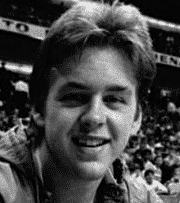
Ricky Blanton

Bernard Woodside
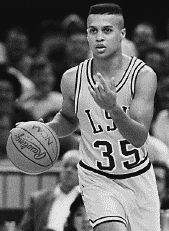
Chris Jackson
Top of Page |
References: Fighting Tigers Basketball, Bruce Hunter and Joe Planas
Dale Brown's Memoirs from LSU Basketball
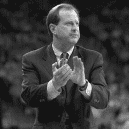
John Brady
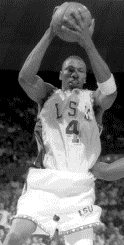
Stromile Swift
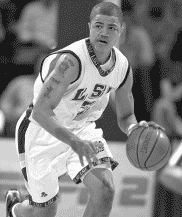
Torris Bright
|
On Wednesday, February 16, 2000, the Tigers let everyone know they were back in the top echelon in the SEC. That night the Tigers handed the Ole Miss Rebels their worst loss in the 34-year history of their home arena, 97-53. John Brady's 16th-ranked team achieved additional milestones.
- The Tigers moved their record to 20-4, the first time the program had tallied 20 wins since 1993.
- LSU won consecutive conference road games for the first time since January 1995. Furthermore, the two road wins were by 33+ points.
- The 7-4 conference record was the best this late in the season since 8-4 in '93.
The Tigers started slowly against the 15-9 Rebels. However, with the score 17-15, LSU went on a 12-1 run and never looked back. The lead rose to 43-23 at the half. Five players scored in double figures, led by sophomore F Stromile Swift with 18. Afterwards, Brady said of his third Tiger team, "That's the best I've had a team play on the road."
The 2000 Tigers won their remaining five conference games to win the SEC West Division for the first time in school history and the regular season conference championship for the first time since 1991. Then they made it to the NCAA Sweet Sixteen to finish with a 28-6 record.
Swift was voted to the All-SEC Coaches and AP First Teams and named Co-Player of the Year. C Jabari Smith made the Coaches 2nd Team All-Conference while freshman G Torris Bright made AP Third Team All-SEC.
Here's the LSU box score from that scintillating night in Oxford.
| Player |
FG |
FT |
Reb |
Asst |
PF |
Points |
| Brian Beshara |
5-7 |
6-6 |
4 |
2 |
1 |
17 |
| Torris Bright |
4-7 |
2-2 |
2 |
3 |
5 |
11 |
| Stromile Swift |
5-8 |
8-10 |
6 |
2 |
2 |
18 |
| Lamont Roland |
5-6 |
6-8 |
7 |
2 |
0 |
17 |
| Jabari Smith |
2-4 |
0-0 |
3 |
2 |
2 |
4 |
| Brian Green |
0-0 |
0-0 |
0 |
0 |
0 |
0 |
| Brandon Landry |
0-1 |
0-0 |
0 |
0 |
1 |
0 |
| Ronald Dupree |
4-9 |
0-0 |
8 |
0 |
3 |
8 |
| Jermaine Williams |
2-3 |
6-6 |
1 |
1 |
2 |
10 |
| Collis Temple |
2-2 |
2-2 |
0 |
1 |
1 |
8 |
| Jack Warner |
0-0 |
0-0 |
0 |
0 |
0 |
0 |
| Brad Bridgewater |
2-3 |
0-2 |
2 |
0 |
1 |
4 |
Top of Page |
|
|

 1952-3 Tigers
1952-3 Tigers
























